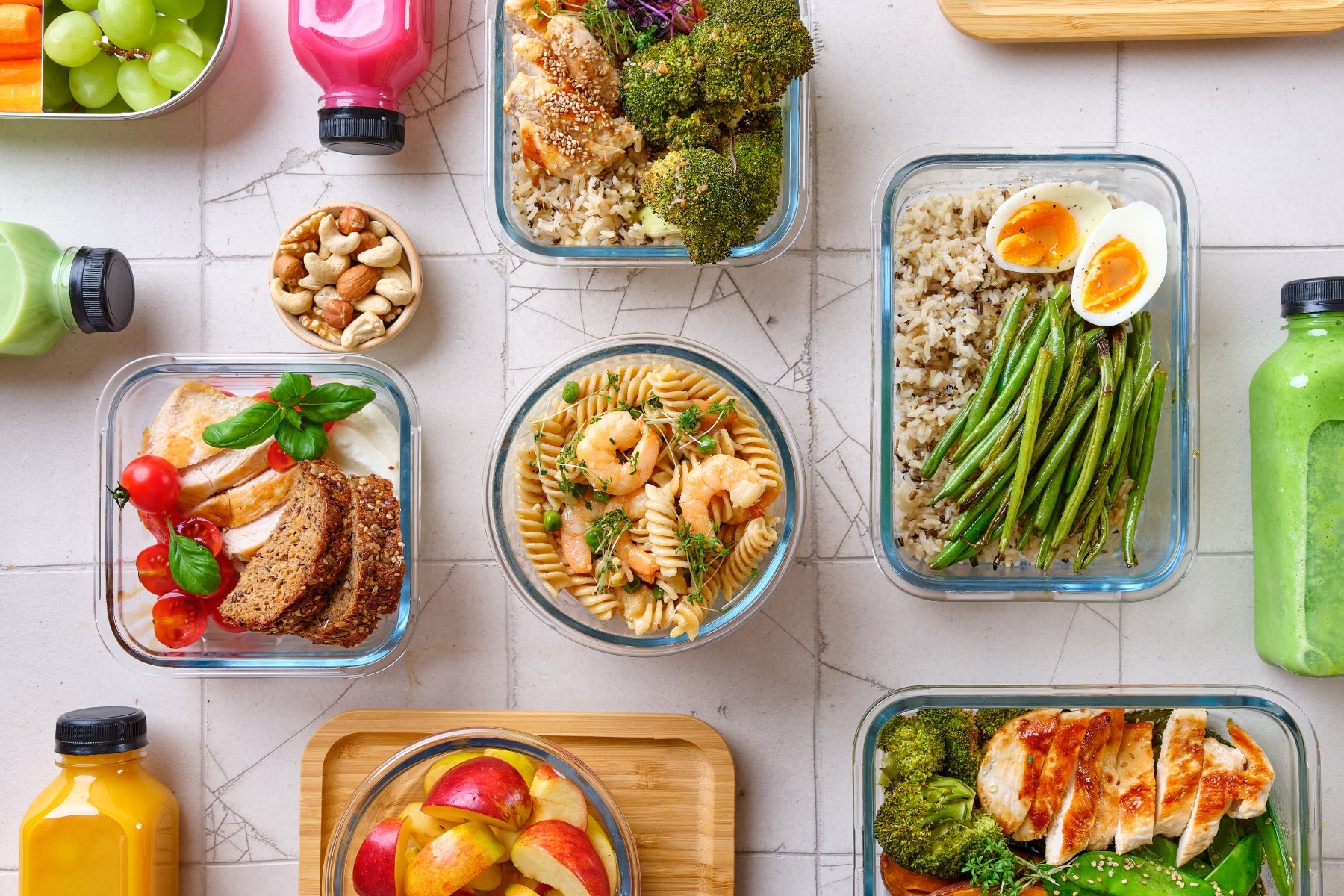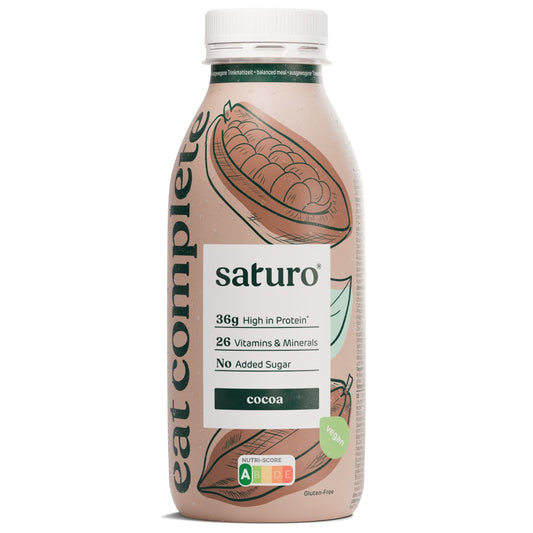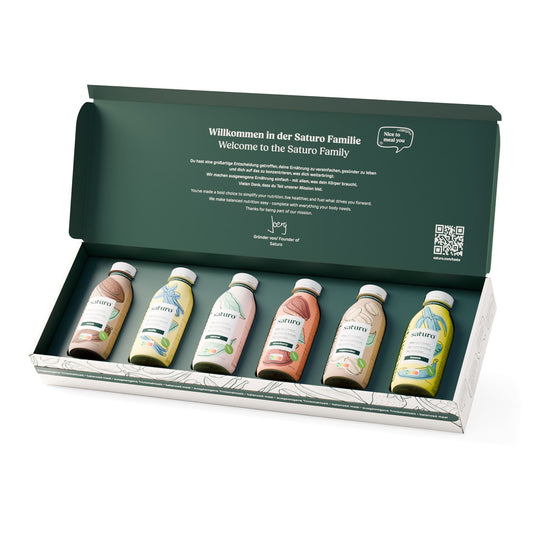
Meal Prepping: Guide for a healthy and time -saving diet
What is Meal Prepping?
Definition of Meal Prepping
Meal Prepping is a method in which you are planning, shopping and preparing your meals for the coming week in advance. This not only saves time and money, but can also make sure that you eat a balanced and healthy eating.
Advantages of Meal Prepping
- You save a lot of time because you don't have to cook every day
- You always have a healthy meal at hand and you are not tempted to eat unhealthy fast food
- By planning in advance, you also save money because you go shopping in a targeted manner
- You reduce food waste because you only buy and cook what you will really consume
Who is Meal Prepping for?
Meal Prepping is perfect for everyone who has little time to cook but still want to eat healthy. No matter whether working people, students, athletes or families - everyone can benefit from the previous cooking.
Planning is everything - step by step to the perfect meal prep
Create a weekly plan
First think about how many days you want to cook and plan a correspondingly many meals. Also take into account whether you need a change at lunch or prefer to cook a large portion for several days.
Select recipes
Choose delicious and healthy recipes that are well suited for cooking. Pay attention to a balanced nutrient distribution with sufficient proteins, complex carbohydrates and healthy fats. Fresh vegetables should of course not be missing.
Write shopping list
Write a shopping list with all the ingredients you need for your selected recipes. Check beforehand which food you still have at home so that you don't buy anything twice.
Shopping and preparing ingredients
Go shopping with your list and then prepare all the ingredients. Washing and cutting vegetables, cooking rice or quinoa and may marine meat or fish. The more you already do, the faster the cooking will go later.
Storage and durability of pre -cooked dishes
Correct storage
Keep the finished meals in closed containers in the fridge. Glass or special meal prep boxes made of plastic are suitable. Pope everything directly into the boxes, so you save time later.
Note the shelf life
Pre-boiled meals stay in the fridge at 2-4 degrees for about 3-4 days. Rice and pasta even up to 5 days. Always pay attention to the best -before date of the ingredients used and smell it for safety before eating.
Freezing Meal Preps
You can also freeze most of the dishes and thaw later. So you always have a supply of healthy meals. It is best to use special freezer bags for freezing and label them with content and date. Most dishes are killed for 2-6 months.
Time -saving tips and tricks for your Meal Prep routine
Choose simple recipes
Especially as a beginner, you should not choose too complicated recipes, but start with simple dishes. One-pot dishes such as soups, stews or casseroles are ideal because they require little effort.
Cook several meals at the same time
Save even more time by cooking several recipes in parallel. For example, you can prepare oven dishes while simmering a little on the stove.
Use kitchen helpers and devices
Many work steps can be automated with a rice cooker, an electrical quick cooking pot or a blender. A good steam cooker can also be very helpful in the Meal Prepping.
Create supply to basic ingredients
Always keep a supply of basic ingredients such as rice, pasta, lentils, couscous, can beans, tomatoes, frozen vegetables and spices at home. So you can start spontaneously, even if you don't get to shop.
Creative recipe ideas for varied meal preps
Healthy Bowl dishes
Bowls are in trend and super easy in the preparation. Simply combine a protein source such as chicken, salmon or tofu with wholemeal rice, quinoa or sweet potatoes and lots of vegetables. Top everything with a delicious dressing or hummus.
Delicious one-pot pasta
Cook noodles together with vegetables such as zucchini, mushrooms or spinach, cherry tomatoes and herbs in a saucepan. The sauce is created by the pasta's cooking water on its own. Super creamy and uncomplicated!
Nutritious soups and stews
Whether pumpkin soup, lentil stew or Asian noodle soup - once you have cooked several portions in stock. Soups can be freezed and easily thawed if necessary.
Crunchy salads in the glass
Like all ingredients for your favorite salads in mason jars. Starting with the dressing, then firmer vegetables and proteins and at the top the sensitive leaf salads. The salads stay in the refrigerator for 3-5 days.
Homemade snacks and bars
Healthy snacks for in between can also be cooked. How about, for example, homemade energy seals, bliss balls or vegetable chips? Much better than any chocolate bar!
Meal Prepping on the way - this is how you stay in the office and when traveling on track
Pack lunch box for work
Invest in a high -quality lunch box with different subjects in order to be able to transport your prepared meals safely and appetizing to the office. Many boxes are also suitable for microwave if you want to warm up your food.
Freeze and thaw meals
Freeze individual portions of your meal preps, which you can easily take with you to the office and thaw there. They are ready for consumption until the lunch break.
Meal Prep also possible in the hotel
You can also eat healthy when traveling thanks to Meal Prepping. It is best to book accommodation with a kitchen or at least a refrigerator. Many hotels also offer microwaves for guests.
Always have pre -cooked snacks with you
Your homemade energy bars, nut mixes or vegetable sticks are the perfect snacks for on the go. You stay fresh and crunchy in a reinforceable can for a long time.
Sustainable and consciously shopping for your meal preps
Buy seasonally and regional
Pay attention to seasonal and regional vegetables and fruit when shopping. This not only protects the environment, it also tastes much better and is often cheaper than imported foods.
Avoid packaging waste
Buy fruit, vegetables and loose goods unpacked if possible. Use fabric bags and containers for your purchase that you can use again and again instead of buying plastic bags. Also pay attention to recycled packaging for canned goods and drinks.
Prefer organic food
Where possible, choose organic food, especially with animal products such as eggs, milk and meat. This is how you support animal welfare and agriculture without pesticides and additives.
Do not buy too large quantities
Plan exactly how much you can really consume in a week and don't buy too much at once. You can freeze leftovers, but still make sure that as little as possible remains at the end of the week.
Your weekly schedule as a start -up aid - meal prep ideas for 7 days
Monday:
- Breakfast: Overnight Oats with berries and nuts
- Center: quinoa salad with fried chicken and avocado
- Evening: pumpkin soup with wholemeal rolls
Tuesday:
- Breakfast: whole grain waffles with peanutism and banana
- Center: Colorful remnant-vegetable pan with rice
- Evening: oven-sweet potato with chili beans and cottage cheese
Wednesday:
- Breakfast: green smoothie with spinach and mango
- Center: lens bolognese with whole grain pasta
- Evening: baked salmon with oven vegetables
Thursday:
- Breakfast: Chia pudding with coconut milk and raspberries
- Mittag: couscous salad with grilled vegetables and chickpeas
- Evening: filled zucchini with tomato rice
Friday:
- Breakfast: scrambled eggs with wholemeal toast and avocado
- Center: Asian glass noodle soup with Pak Choi
- Evening: homemade burgers with sweet potato fries
Saturday:
- Breakfast: protein pancakes with a berry compot
- Center: Marrokan chickpea stew
- Evening: Pita bags with falafel and herb salad
Sunday:
- Breakfast: breakfast muffins with egg and spinach
- Center: Large lettuce plate with turkey strips
- Evening: One Pot Pasta Primavera
Meal Prepping is a great method to save time, money and stress in everyday life. With the right planning, organization and a few delicious recipes in the repertoire, you can find this in no time. Just give it a try - your health and well -being will thank you!
No time for Meal Prepping?
If, despite all the tips and recipes, you don't have the time or desire for meal props, they are delicious drinking meals of Saturo The perfect solution for you. With Saturo you save all the work and always have a quick, balanced meal at hand - whether at home, in the office or on the go. The powder and finished drinks in different flavors provide you with all important nutrients and take a long time, without cooking or washing up. So you can fully concentrate on the important things in your life without having stress with the food preparation.
-
4.5 4.5 / 5.0
(144)
Ready-to-drink 6 x 400 ml
- The ready-to-drink meal
- 400 kcal
- 36 g protein
- Satiates for up to 5 hours
Regular price €26,34Regular priceUnit price / per -
4.5 4.5 / 5.0
(144)
Taster Pack 6 x 400 ml
- Find your favourite flavour
- 6 different flavours
- 400 kcal
- 36 g protein
Regular price €29,99Regular priceUnit price / per
Frequently asked questions
How much does Meal prep cost?
The cost of Meal Prepping depends heavily on which food you use and in which quantities you buy. Basically, you can save money by preparing larger quantities at once and thereby wasting less food. With a clever planning and the use of seasonal and regional ingredients, you save money compared to daily cooking or eating.
Which foods are suitable for the Meal Prep?
Food that can be well prepared and can be stored in the fridge for a few days are particularly suitable for meal prepipping. These include potatoes, rice, pasta and legumes as side dishes, vegetables such as broccoli, peppers or carrots as well as lean meat, fish and tofu as protein sources.
How do you do Meal Prep correctly?
The most important steps for successful meal preping are good planning with a weekly plan and shopping list, the preparation as many ingredients as well as the correct storage of the finished meals. When planning, pay attention to a balanced nutrient composition and varied recipes. You then fill the prepared dishes into boxes or other lockable containers and keep them in the fridge for up to 4 days.



